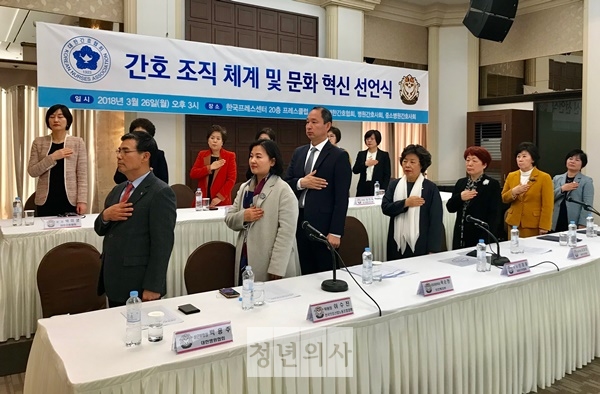Korea’s nursing community pledged to root out the "taeum” (burn-to-ashes) culture that led a nurse at Asan Medical Center to commit suicide in February, by reforming work rules and protecting the nurses’ rights.
Their move came as critics pointed out that the nurses’ bullying culture stemmed from harsh working conditions. The government also recently announced measures to improve nurses’ work environment and welfare.

The Korean Nurses Association (KNA), the Hospital Nurses Association, and the Small and Medium Hospital Nurses Association on Monday announced the “Declaration of Innovation for Nursing Organizations and Culture” and 10 tasks at Press Center in central Seoul.
The 10 tasks include a ban on inhumane acts such as verbal and physical assaults and an effort to enhance the education system and compensation system with the right to education of new nurses. The nursing groups will also give at least three months of adaptation and education period to new nurses and allow nurses to refuse unlawful acts such as the work of other areas.
The tasks also call for encouraging nurses to refuse unlawful comprehensive wage contracts and overtime work without allowance. Nurses will not be forced to take turns in getting pregnant for more work and seek maternity protection.
Other tasks include resolving problems of the hospital evaluation system, carrying out campaigns to ensure that medical institutions comply with labor standards, resolving problems through cooperation with hospitals, and engaging in activities to ensure that the government’s measures for better work environment and treatment are effective.
Shin Kyung-rim, president of the KNA, said she would help the Ministry of Health and Welfare to implement measures to increase nursing workforce through improvement of their work environment.
“Nurses are essential human resources for the public healthcare, but many are leaving the filed due to significantly low manpower allocation and poor rewards,” Shin said. “We will actively participate and help the ministry successfully carry out the plan to secure appropriate nursing manpower.”
Shin promised to start a campaign to reform the nursing culture of the KNA. “I will do my best to encourage all the nurses to respect each other and guarantee adaptation period for new nurses,” she said.
The health and welfare ministry and the Korean Hospital Association (KHA) said they would also actively cooperate with the nurses.
Kwak Soon-heon, director of the ministry's Healthcare Resource Policy Division, expressed gratitude to the nursing community for devising up self-help measures to create a good environment to implement the government’s policy.
“To execute the measures properly, we need close cooperation with the nursing groups and hospitals. We will make every effort to make a win-win policy for both nurses and hospitals,” Kwak said.
He admitted that some critics raised concerns and criticism that the government measures were centered only on guidelines. Kwak said the government would carry out the steps through proper monitoring, as the government has worked hard with hospitals to draw up the measures.
“There is a misunderstanding about increasing the supply of workforce. From 2018 to 2022, about 103,000 nurses are expected to be added to the market. What we’re to do is to increase the number of those who do not leave the field without a government policy,” Kwak said.
“We will implement the policy so that both hospitals and nurses can coexist.”
KHA Vice President Park Yong-joo said, “Hospitals and nursing groups have taken the first step together to better the nursing environment. I sincerely hope that the co-work will build good working conditions for nurses and eventually play a crucial role in saving patients.”
The health and welfare ministry recently held a meeting of the health insurance policy and deliberation committee and passed a plan to secure appropriate nursing workforce through upgrading work environment.
Under the plan, the government will change the criteria for calculating the differentiated payment for nursing management from the current number of beds to the number of patients.
The government will also expand labor cost support to treat better nurses working at regional trauma centers. The differentiated payment for nursing management refers to a payment system where hospitals are graded based on the number of patients per nurse and receive different reimbursements depending on grades.
To alleviate the burden of night work for nurses and to reinforce compensation, the government will support night shift costs for nurses at inpatient wards, enhance support for managing nurses who work at night only, and establish a night duty guidelines.
The ministry also said it would use more than 70 percent of an income increased due to the change in the differentiated payment for nursing management to be used for shifting more nurses to regular jobs and additional hiring. The government will also monitor the implementation quarterly.

